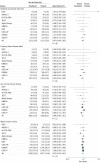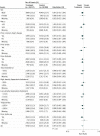Associations of Omega-3 Fatty Acid Supplement Use With Cardiovascular Disease Risks: Meta-analysis of 10 Trials Involving 77 917 Individuals
- PMID: 29387889
- PMCID: PMC5885893
- DOI: 10.1001/jamacardio.2017.5205
Associations of Omega-3 Fatty Acid Supplement Use With Cardiovascular Disease Risks: Meta-analysis of 10 Trials Involving 77 917 Individuals
Abstract
Importance: Current guidelines advocate the use of marine-derived omega-3 fatty acids supplements for the prevention of coronary heart disease and major vascular events in people with prior coronary heart disease, but large trials of omega-3 fatty acids have produced conflicting results.
Objective: To conduct a meta-analysis of all large trials assessing the associations of omega-3 fatty acid supplements with the risk of fatal and nonfatal coronary heart disease and major vascular events in the full study population and prespecified subgroups.
Data sources and study selection: This meta-analysis included randomized trials that involved at least 500 participants and a treatment duration of at least 1 year and that assessed associations of omega-3 fatty acids with the risk of vascular events.
Data extraction and synthesis: Aggregated study-level data were obtained from 10 large randomized clinical trials. Rate ratios for each trial were synthesized using observed minus expected statistics and variances. Summary rate ratios were estimated by a fixed-effects meta-analysis using 95% confidence intervals for major diseases and 99% confidence intervals for all subgroups.
Main outcomes and measures: The main outcomes included fatal coronary heart disease, nonfatal myocardial infarction, stroke, major vascular events, and all-cause mortality, as well as major vascular events in study population subgroups.
Results: Of the 77 917 high-risk individuals participating in the 10 trials, 47 803 (61.4%) were men, and the mean age at entry was 64.0 years; the trials lasted a mean of 4.4 years. The associations of treatment with outcomes were assessed on 6273 coronary heart disease events (2695 coronary heart disease deaths and 2276 nonfatal myocardial infarctions) and 12 001 major vascular events. Randomization to omega-3 fatty acid supplementation (eicosapentaenoic acid dose range, 226-1800 mg/d) had no significant associations with coronary heart disease death (rate ratio [RR], 0.93; 99% CI, 0.83-1.03; P = .05), nonfatal myocardial infarction (RR, 0.97; 99% CI, 0.87-1.08; P = .43) or any coronary heart disease events (RR, 0.96; 95% CI, 0.90-1.01; P = .12). Neither did randomization to omega-3 fatty acid supplementation have any significant associations with major vascular events (RR, 0.97; 95% CI, 0.93-1.01; P = .10), overall or in any subgroups, including subgroups composed of persons with prior coronary heart disease, diabetes, lipid levels greater than a given cutoff level, or statin use.
Conclusions and relevance: This meta-analysis demonstrated that omega-3 fatty acids had no significant association with fatal or nonfatal coronary heart disease or any major vascular events. It provides no support for current recommendations for the use of such supplements in people with a history of coronary heart disease.
Conflict of interest statement
Figures




Comment in
-
Questioning the Associations of ω-3 Fatty Acid Supplement Use With Cardiovascular Disease Risks-Reply.JAMA Cardiol. 2018 Aug 1;3(8):781-782. doi: 10.1001/jamacardio.2018.1312. JAMA Cardiol. 2018. PMID: 29874365 No abstract available.
-
Questioning the Associations of ω-3 Fatty Acid Supplement Use With Cardiovascular Disease Risks.JAMA Cardiol. 2018 Aug 1;3(8):781. doi: 10.1001/jamacardio.2018.1309. JAMA Cardiol. 2018. PMID: 29874369 No abstract available.
Similar articles
-
Omega-3 fatty acids for the primary and secondary prevention of cardiovascular disease.Cochrane Database Syst Rev. 2018 Nov 30;11(11):CD003177. doi: 10.1002/14651858.CD003177.pub4. Cochrane Database Syst Rev. 2018. Update in: Cochrane Database Syst Rev. 2020 Feb 29;3:CD003177. doi: 10.1002/14651858.CD003177.pub5 PMID: 30521670 Free PMC article. Updated.
-
Marine Omega-3 Supplementation and Cardiovascular Disease: An Updated Meta-Analysis of 13 Randomized Controlled Trials Involving 127 477 Participants.J Am Heart Assoc. 2019 Oct;8(19):e013543. doi: 10.1161/JAHA.119.013543. Epub 2019 Sep 30. J Am Heart Assoc. 2019. PMID: 31567003 Free PMC article.
-
Effects of omega-3 fatty acids on coronary revascularization and cardiovascular events: a meta-analysis.Eur J Prev Cardiol. 2024 Nov 11;31(15):1863-1875. doi: 10.1093/eurjpc/zwae184. Eur J Prev Cardiol. 2024. PMID: 38869144
-
Association between omega-3 fatty acid supplementation and risk of major cardiovascular disease events: a systematic review and meta-analysis.JAMA. 2012 Sep 12;308(10):1024-33. doi: 10.1001/2012.jama.11374. JAMA. 2012. PMID: 22968891 Review.
-
Omega-3 dietary supplements and the risk of cardiovascular events: a systematic review.Clin Cardiol. 2009 Jul;32(7):365-72. doi: 10.1002/clc.20604. Clin Cardiol. 2009. PMID: 19609891 Free PMC article. Review.
Cited by
-
Role of n-3 long-chain polyunsaturated fatty acids in human nutrition and health: review of recent studies and recommendations.Nutr Res Pract. 2021 Apr;15(2):137-159. doi: 10.4162/nrp.2021.15.2.137. Epub 2021 Jan 4. Nutr Res Pract. 2021. PMID: 33841720 Free PMC article. Review.
-
Dose-Dependent Risk Reduction for Myocardial Infarction with Eicosapentaenoic Acid: a Meta-analysis and Meta-regression Including the STRENGTH Trial.Cardiovasc Drugs Ther. 2021 Oct;35(5):1079-1081. doi: 10.1007/s10557-021-07212-z. Epub 2021 Jun 8. Cardiovasc Drugs Ther. 2021. PMID: 34101063 Free PMC article. No abstract available.
-
The journey of omega-3 fatty acids in cardiovascular medicine.Eur Heart J Suppl. 2020 Oct 6;22(Suppl J):J49-J53. doi: 10.1093/eurheartj/suaa118. eCollection 2020 Oct. Eur Heart J Suppl. 2020. PMID: 33061867 Free PMC article.
-
Novel Classification of Cardiovascular Disease Subtypes Reveals Associations Between Mortality and Polyunsaturated Fatty Acids: Insights from the United Kingdom Biobank Study.Curr Dev Nutr. 2024 Aug 5;8(9):104434. doi: 10.1016/j.cdnut.2024.104434. eCollection 2024 Sep. Curr Dev Nutr. 2024. PMID: 39286552 Free PMC article.
-
ω-6 and ω-9 polyunsaturated fatty acids with double bonds near the carboxyl head have the highest affinity and largest effects on the cardiac IKs potassium channel.Acta Physiol (Oxf). 2019 Feb;225(2):e13186. doi: 10.1111/apha.13186. Epub 2018 Oct 17. Acta Physiol (Oxf). 2019. PMID: 30184322 Free PMC article.
References
-
- Kromhout D, Bosschieter EB, de Lezenne Coulander C. The inverse relation between fish consumption and 20-year mortality from coronary heart disease. N Engl J Med. 1985;312(19):1205-1209. - PubMed
-
- Zheng J, Huang T, Yu Y, Hu X, Yang B, Li D. Fish consumption and CHD mortality: an updated meta-analysis of seventeen cohort studies. Public Health Nutr. 2012;15(4):725-737. - PubMed
-
- Burr ML, Fehily AM, Gilbert JF, et al. . Effects of changes in fat, fish, and fibre intakes on death and myocardial reinfarction: Diet and Reinfarction Trial (DART). Lancet. 1989;2(8666):757-761. - PubMed
-
- Burr ML, Ashfield-Watt PA, Dunstan FD, et al. . Lack of benefit of dietary advice to men with angina: results of a controlled trial. Eur J Clin Nutr. 2003;57(2):193-200. - PubMed
Publication types
MeSH terms
Substances
Grants and funding
LinkOut - more resources
Full Text Sources
Other Literature Sources

